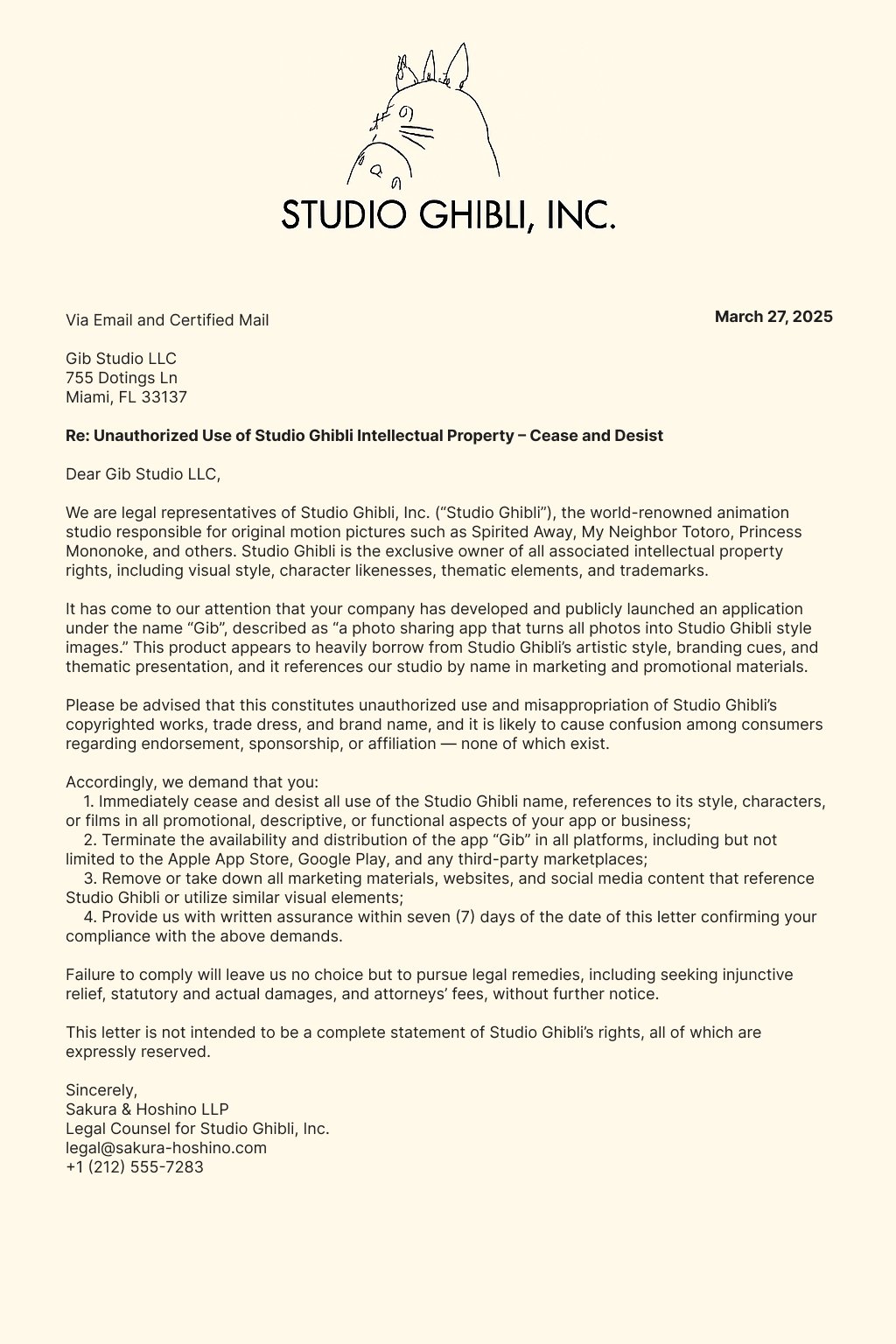Amid debate over AI-generated art in Studio Ghibli style, a fake ‘cease and desist’ order goes viral
Soon after OpenAI’s latest model let users to reimagine their lives in Studio Ghibli’s iconic style, a ‘cease and desist’ notice allegedly from the legal representatives of the popular Japanese animation studio went viral on social media.
On March 26, Sam Altman’s OpenAI, maker of the popular artificial intelligence chatbot ChatGPT that competes with X’s Grok and Meta’s Perplexity, rolled out its GPT-4o image generator. The enhanced capabilities of the image generator allowed users to recreate real-life images in the artistic style of legendary animator Hayao Miyazaki, a co-founder of Studio Ghibli.
Hours after the rollout, social media was abuzz with hundreds of thousands of people sharing Studio Ghibli versions of themselves as AI enabled them to step into Miyazaki’s magical world. However, critics were quick to point out that uncredited mimicry of Ghibli’s distinctive animation style, through AI, undermines the originality and laborious hard work of artists, besides being a mark of disrespect to the creators. Miyazaki, whose animation films largely use hand-drawn frames, has strongly disapproved of AI-generated art, describing it as “an insult to life itself.” Altman, on the other hand, believes that it has democratised content creation. “There are negative things about it, for sure, and certainly it did something about the art form. But I think on a whole, it’s been a win,” he said.
On March 27, a day after OpenAI rolled out this feature, X user @tj_littlejohn posted a ‘cease and desist’ notice allegedly from those representing Studio Ghibli against a photo sharing application called ‘Gib’ that “turns all photos into Studio Ghibli style images”.
In the caption of the post, the user said, ‘AI creators deserve protection, not punishment’, while also mentioning that they were assembling a legal team to fight Studio Ghibli’s order.
At the time of this article being written, the post racked up over five million views and has been shared over 2,000 times. (Archive)
The letter in the post says that the application borrows from Ghibli’s distinctive visual style without giving it due credit, which infringes upon the studio company’s copyright and intellectual property. It also said that the unauthorized use of its brand name by ‘Gib’ was also likely to create confusion among audiences, because it may create an impression of official endorsement or affiliation. The notice also demanded removal of all social media content, including marketing material that has references to Studio Ghibli, or similar visual elements.

The claim that a ‘cease and desist’ notice had been issued by Studio Ghibli was amplified by several other users, who highlighted the ethical questions surrounding artificial generation of the Japanese studio’s distinctive aesthetics. (Archives – 1, 2, 3)
Click to view slideshow.
The claim was also viral on Facebook.
Click to view slideshow.
Fact Check
To verify the authenticity of this letter, Alt News checked the email address attributed to Studio Ghibli’s “legal counsel”, Sakura & Hoshino LLP, in the letter. An email sent to their address (legal@sakura-hoshino.com) bounced back, indicating that the mail address did not exist.

Readers must also note that the lawyers’ firm was not listed anywhere on the internet.
We then tried to verify the contact number of the legal counsel. Our calls did not go through.
Turns out the prefix used for the area code in the notice was fictional.
North American phone numbers consist of an area code, a prefix, and the line number. In this case, the area code (212) corresponds to Manhattan. The prefix (555), however, is mostly reserved for fictional purposes, to be used especially in movies, TV shows, and books, to avoid accidentally using real phone numbers. The prefix mentioned in the notice is not commonly assigned to regular subscribers.

Moreover, on inspecting the X feed of the user who posted the notice, we came across a post from March 28 where he alludes to ‘Gib’ being a ‘fake’ app. Note that the image generator rolled out by OpenAI was not named Gib. However, the ‘cease and desist’ notice was shared by many in context of the debate surrounding AI-generated after OpenAI’s feature took the internet by storm.

On March 28, in an interview with Japanese broadcaster NHK (Japan Broadcasting Corporation), Studio Ghibli confirmed that they had not issued any warning letter.
To sum up, firstly, the viral ‘cease and desist’ notice had nothing to do with the viral AI-generated Studio Ghibli images enabled by OpenAI. Second, the details mentioned in the letter, including the very app that the notice is against and contact information of the legal counsel, are fictitious and made up. Third, Studio Ghibli has itself denied it issued any warning note.
The post Amid debate over AI-generated art in Studio Ghibli style, a fake ‘cease and desist’ order goes viral appeared first on Alt News.
News